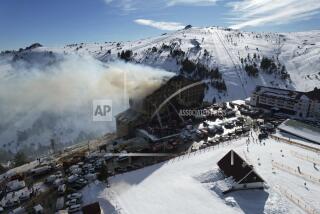Dozens Slain in Blasts at Egypt Resort
- Share via
SHARM EL SHEIK — Explosions thundered through Egypt’s Red Sea resort of Sharm el Sheik before dawn today, killing at least 62 people and wounding at least 116, officials said.
Interior Minister Habib Adli said eight of the dead were foreigners. Dozens of the injured were in serious condition and rescuers were still looking for victims, so the death toll could rise.
There was no immediate claim of responsibility for the blasts, apparently caused by car bombs that targeted hotels in the resort’s Naama Bay and other popular tourist spots at the southern tip of the Sinai Peninsula. The explosions could have been designed to deal another blow to Egypt’s tourism industry, a crucial engine of the nation’s economy.
But they also struck a day before suspects in previous resort bombings were to go on trial in the town of Ismailiya on the Suez Canal.
Those October explosions, in the Sinai resort town of Taba, were part of a series of attacks Islamic extremists have launched against Egypt’s tourist areas over the last year. Smaller blasts went off in April near Cairo’s ancient marketplaces and world-famous Egyptian Museum.
The first explosion today erupted about 1 a.m. at Sharm el Sheik’s bazaar, witnesses told news agencies, sending clouds of black smoke through the town. That strike was followed by blasts at resort sites hugging the edge of the sea along Naama Bay.
Rescue workers were quickly on the scene, and hours later they still toiled amid the fires and heavy smoke hanging over the city, with the smell of the explosives permeating the air.
Emergency crews from more than 60 miles away were headed to the area, including a team of at least 20 doctors from Cairo.
Tourists streamed steadily from resort hotels and headed for the airport.
Salma Dahbur, 32, stood by the side of the road with her three children. She was cutting short their vacation and heading back to her home in Cairo.
“It’s not comfortable” after the explosions, she said. The children “all heard it. We came for summer vacation and we didn’t expect this.”
The Ghazala Gardens hotel, a sprawling four-star resort, was devastated. The roof was gone, as was the entire front and the central part of the structure, including restaurants and the reception area. Some walls farther back still stood.
Farid Fouad, the manager of a casino next to the Ghazala Gardens, said, “We heard the explosion and saw the light. To think in just one moment they can destroy all of this.”
The nearby seaside Movenpick hotel was also hit. A harried employee who answered the telephone confirmed that there had been an explosion there, then hung up.
Outside a supermarket about a block from the Movenpick, broken glass was everywhere. Night manager Mohammed Sayed, 28, said customers were inside when they heard an explosion. When they rushed to a parking lot across the street, another bomb went off. Ambulance workers told him that eight people were killed and 18 others injured.
“When the first explosion went off, I thought it was the electrical wiring. When the second explosion went off, I thought all of Sharm el Sheik was being destroyed,” he said.
The vast resort complexes, seaside restaurants and dance clubs in Sharm el Sheik are a popular playground for foreign tourists and wealthy Egyptians.
Egyptian President Hosni Mubarak owns a villa near the Movenpick. British Prime Minister Tony Blair has brought his family to Sharm el Sheik to spend the Christmas holiday.
“This is a catastrophe, a terrible catastrophe,” said Osama Sebai, a construction manager at the nearby Aida Hotel. “The strikes hit the city before the start of our season. We expect massive cancellations.”
Egypt’s tourism industry is built on two main pillars: its ancient ruins and the free-wheeling resorts of the Sinai. It has remained sturdy despite an emerging pattern of attacks against vacationers.
In October, 34 people were killed when a string of car and truck bombings targeted resorts in the Sinai resort of Taba and nearby beaches, close to the Israeli border. Many of the victims were Israeli tourists.
The violence soon moved to Cairo. In early April, a suicide attack killed three tourists, and weeks later, nine people were injured in an explosion and shooting rampage. The strikes increased fear of a rising wave of violence against tourists, but the Egyptian government dismissed the attacks as the work of isolated amateurs.
The recent violence also revived memories of the 1990s, when Islamist insurgents waged a bloody battle against the government. Tourism hotspots were a prime target in that struggle, which was put down ruthlessly by security forces. The violence peaked in 1997, when 58 tourists were massacred in the ancient Nile city of Luxor.
Times special correspondent Hossam Hamalawy in London contributed to this report.
More to Read
Sign up for Essential California
The most important California stories and recommendations in your inbox every morning.
You may occasionally receive promotional content from the Los Angeles Times.










